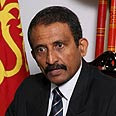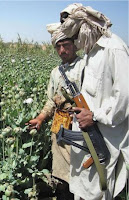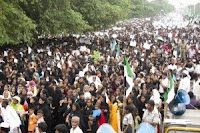Saturday 31 July 2010
Sri Lanka: The JVP’s cynical posturing as a defender of democracy
The Democratic National Alliance (DNA) held a protest in Colombo last week demanding the release of its leader former general Sarath Fonseka and the restoration of democracy in Sri Lanka. The demonstration was another attempt by the DNA’s main component, the Janatha Vimukthi Peramuna (JVP), to exploit rising anti-government sentiment by cynically posturing as a defender of democratic rights. Read more>>>
Turkey and the Ottomans
It was the month of Rajab the Khilafah came to an end in Turkey. Various individuals in post-Ottoman Turkey have attempted to wipe its history away, but Turkey under the Ottoman's was the world superpower for centuries - this will remain the history of Turkey, whatever its future course. Read more>>>
Friday 30 July 2010
EU, Australia and Canada impose tough sanctions on Iran
As part of Washington’s intensifying campaign against Iran, the European Union (EU), Canada and Australia imposed hefty new sanctions this week against Tehran over its nuclear programs. While promoted as means of pressuring Iran, the sanctions are a further escalation of a dangerous confrontation that is setting the stage for war. Read more>>>
UN court upholds Kosovo’s declaration of independence
The United Nations International Court of Justice (ICJ) ruled last week by ten votes to four that Kosovo’s unilateral declaration of independence from Serbia on February 17, 2008 was legal.
The ICJ agreed to rule on the legality of Kosovo’s secession at the request of Serbia, which argued that the Serbian province’s declaration of independence was prohibited under international law. The verdict was condemned by Serbian President Boris Tadic, who warned that the ICJ opinion could open up “an entire process of creating new states … throughout the world, something that would destabilize many regions of the world.” Read more>>>
The ICJ agreed to rule on the legality of Kosovo’s secession at the request of Serbia, which argued that the Serbian province’s declaration of independence was prohibited under international law. The verdict was condemned by Serbian President Boris Tadic, who warned that the ICJ opinion could open up “an entire process of creating new states … throughout the world, something that would destabilize many regions of the world.” Read more>>>
Tuesday 27 July 2010
Calls to ban burqa ignore real issue of how women are oppressed in the West
The Western media has been fuelling the debate on the Muslim women's dress code, following the ban on the niqaab and burqa in the French Parliament and calls by a Conservative MP Philip Hollobone for a ban in the UK. The current climate is very similar to the period when the Labour MP and former Home Secretary, Jack Straw, raised the issue some years ago. In light of this debate we would make the following points: Read more>>>
Friday 23 July 2010
Does Sri Lanka back Israel's war......?
Sri Lanka’s Ambassador to Israel and former Chief of Staff Donald Perera says Lanka is a staunch supporter of Israel's fight against Palestinian terror. He also says the Palestinians should be offered direct negotiations, without preconditions.
"No one wants bloodshed. The other side (Palestinians) should be offered direct negotiations, without preconditions, to determine its level of seriousness. These talks should focus on trying to reach a compromise that would allow both sides to sign an agreement," he said in and interview with Yedioth Ahronoth. Read more>>>
"No one wants bloodshed. The other side (Palestinians) should be offered direct negotiations, without preconditions, to determine its level of seriousness. These talks should focus on trying to reach a compromise that would allow both sides to sign an agreement," he said in and interview with Yedioth Ahronoth. Read more>>>
Tuesday 20 July 2010
Monday 19 July 2010
50 years ago: Madam Sirimavo Bandaranaike becomes PM of Ceylon
Sirimavo Bandaranaike was appointed prime minister of Ceylon on July 21, 1960, after national elections in which the LSSP (Lanka Sama Samaja Party), which had abandoned the perspective of Trotskyism, refused to oppose her nationalist grouping, the Sri Lanka Freedom Party (SLFP), or its electoral partner, the Stalinist Communist Party. Read more>>>
Arab autocracy: Thank you and goodbye.
For good or ill, change is coming to Egypt and Saudi Arabia soon; THE fate of the Arab world's two most important states lies in the hands of ageing autocrats. Hosni Mubarak, an 82-year-old air-force general who has ruled Egypt since 1981, is widely reported to be grievously ill. King Abdullah of Saudi Arabia, who assumed the throne of the Arabs' richest country five years ago but has run the show for longer, is reckoned to be 86. The grim reaper will bring change in both places soon. Read more>>>
Sunday 18 July 2010
Tuesday 13 July 2010
Mass roundup in Sri Lankan capital: a sharp warning to the working class
The July 3 military-police attack on thousands of slum dwellers in the Colombo suburbs is a sharp warning to the working class in Sri Lanka and internationally. The brutal assault, followed by the roundup of the entire adult population in the Mattakkuliya area, has demonstrated the police-state methods being brought forward against ordinary working people in the “economic war” declared by President Mahinda Rajapakse’s government.
The police launched the provocation against local residents by forcibly arresting and badly beating a young three-wheel taxi driver. When hundreds of people protested in front of the area’s police station, defence authorities immediately sent the police riot squad and soldiers to attack them. The police and the army went on a rampage, smashing houses and vehicles, and physically attacking and terrorising local residents. Read more>>>
The police launched the provocation against local residents by forcibly arresting and badly beating a young three-wheel taxi driver. When hundreds of people protested in front of the area’s police station, defence authorities immediately sent the police riot squad and soldiers to attack them. The police and the army went on a rampage, smashing houses and vehicles, and physically attacking and terrorising local residents. Read more>>>
Monday 12 July 2010
India; Preaching Sri Lanka on Minority Tamil Rights, Practising Cruelty on Minority Muslims in Kashmir
It is time that our big brother India practises towards its own minority of around 150 million Muslims throughout the country in general and Kashmir in particular what it preaches to Sri Lanka on minority rights.
Time and again Indian government officials from Prime Minister Manmohan Singh to other top officials insist Sri Lankan government of the need to find a solution to Tamil problem though the minority problem in Sri Lanka is not confined to Tamils alone. It should be a comprehensive solution taking into consideration the grievances of Tamils, Muslims and all others. Read more>>>
Time and again Indian government officials from Prime Minister Manmohan Singh to other top officials insist Sri Lankan government of the need to find a solution to Tamil problem though the minority problem in Sri Lanka is not confined to Tamils alone. It should be a comprehensive solution taking into consideration the grievances of Tamils, Muslims and all others. Read more>>>
Saturday 10 July 2010
Indonesia: The Dark Side of Jama’ah Ansharut Tauhid (JAT)
Divisions and ideological debates generated by Jama’ah Ansharut Tauhid (JAT), an organisation founded by Indonesia’s best-known radical cleric, Abu Bakar Ba’asyir, show the weakness of Indonesia’s jihadi movement.
Indonesia: The Dark Side of Jama’ah Ansharut Tauhid (JAT), the latest briefing from the International Crisis Group, examines the many facets of JAT, an ostensibly above-ground organisation whose inner circle has had and continues to have ties to fugitive extremists. It has been in the spotlight since May when three of its officials were accused of helping finance a terrorist training camp in Aceh. Read more>>>
Indonesia: The Dark Side of Jama’ah Ansharut Tauhid (JAT), the latest briefing from the International Crisis Group, examines the many facets of JAT, an ostensibly above-ground organisation whose inner circle has had and continues to have ties to fugitive extremists. It has been in the spotlight since May when three of its officials were accused of helping finance a terrorist training camp in Aceh. Read more>>>
India வரலாறு காணாத மிகப் பிரம்மாண்டப் பேரணி மாநாடு! மக்கள் வௌ்ளத்தில் மூழ்கிய சென்னை!
the Conference on, The Rights of the Oppressed. The Conference on the Rights of the Oppressed organized by Tamil Nadu Thowheed Jamaath on July, the 4th , 2010 at the Island Grounds, Chennai unanimously adopted the following resolutions.
1. The Muslims who have played a major role in the independence and shaping of India have even after 63 years of independence been deprived of their rightful share in education and employment. Justice Rajendra Sachar Commission and Justice Ranganath Mishra Commission have graphically documented this in their Reports. Justice Ranganath Mishra Commission has also recommended 10% separate reservation for the Muslims. This conference thanks Justice Rajendra Sachar and Justice Ranganth Mishra on behalf of the Muslim community . Read more>>>
1. The Muslims who have played a major role in the independence and shaping of India have even after 63 years of independence been deprived of their rightful share in education and employment. Justice Rajendra Sachar Commission and Justice Ranganath Mishra Commission have graphically documented this in their Reports. Justice Ranganath Mishra Commission has also recommended 10% separate reservation for the Muslims. This conference thanks Justice Rajendra Sachar and Justice Ranganth Mishra on behalf of the Muslim community . Read more>>>
Thursday 8 July 2010
Sri Lanka: Government-backed protesters besiege UN office over war crimes investigation
Weerawansa led about 2,000 supporters, including Buddhist monks, shouting communal slogans and burning effigies of Ban Ki-moon. The group broke into the UN office complex and blocked the entrance, preventing the UN staff from leaving. Police provided no protection for the UN, even though its office is located in an official “high security zone” where all protests are banned.
Police later escorted several UN staffers through the blockade. However, according to reporters, Weerawansa phoned the defence secretary, the president’s brother, Gotabhaya Rajapakse, who ordered the police to leave the site. Eventually, foreign affairs secretary Romesh Jayasinghe asked NFF leaders to allow UN officials to leave. Read more>>>
Police later escorted several UN staffers through the blockade. However, according to reporters, Weerawansa phoned the defence secretary, the president’s brother, Gotabhaya Rajapakse, who ordered the police to leave the site. Eventually, foreign affairs secretary Romesh Jayasinghe asked NFF leaders to allow UN officials to leave. Read more>>>
Wednesday 7 July 2010
Khilafah (Islamic State) - Hope for the People
This week, on the 28th of Rajab, the Ummah will mark the 89th anniversary of the fall of the Khilafah. We should use this anniversary as a reminder of our obligation - as an Ummah - to resume the Islamic way of life, through the re-establishment of the Khilafah.
Since the abolishment of the Khilafah in 1342/1924, the Ummah has witnessed a succession of despotic rulers whose sole concern has been to please their Capitalist masters. These dictators, the Assads, Mubaraks, and Zardaris of this Ummah, are eagerly financed, armed, and supported by the parliaments of North America and Europe. Such subjugation has resulted in the political, economic, and social hardships of the Ummah. Read more>>>
Since the abolishment of the Khilafah in 1342/1924, the Ummah has witnessed a succession of despotic rulers whose sole concern has been to please their Capitalist masters. These dictators, the Assads, Mubaraks, and Zardaris of this Ummah, are eagerly financed, armed, and supported by the parliaments of North America and Europe. Such subjugation has resulted in the political, economic, and social hardships of the Ummah. Read more>>>
Islamic Ruling on Military Alliances
Today, we find Muslim countries making military alliances with the kuffar and fighting alongside them. Turkey is a member of NATO and has sent troops to Afghanistan under the UN International Security Assistance Force.
Pakistan has entered a military alliance with America to fight Muslims in the tribal areas and support the Afghan war. Many Muslim countries participate in numerous other military alliances and collective security agreements. Read more>>>
Pakistan has entered a military alliance with America to fight Muslims in the tribal areas and support the Afghan war. Many Muslim countries participate in numerous other military alliances and collective security agreements. Read more>>>
Thursday 1 July 2010
Iimproving Security Policy in Colombia
Colombia’s new government has to improve security policy to tackle the guerrilla tactics of the Revolutionary Armed Forces of Colombia (FARC) as well as their broadened participation in drug trafficking and newly forged alliances with other illegal armed groups.
Improving Security Policy in Colombia , the latest briefing from the International Crisis Group, analyses FARC’s response to government military pressure during the past eight years and the emergence of alliances between the insurgents and other illegal armed groups. While the current administration has made important but insufficient achievements in the struggle against FARC, the country’s next president, Juan Manuel Santos, faces considerable challenges in consolidating security gains. Read more>>>
Improving Security Policy in Colombia , the latest briefing from the International Crisis Group, analyses FARC’s response to government military pressure during the past eight years and the emergence of alliances between the insurgents and other illegal armed groups. While the current administration has made important but insufficient achievements in the struggle against FARC, the country’s next president, Juan Manuel Santos, faces considerable challenges in consolidating security gains. Read more>>>
Global Corporations compete for West African Minerals
Blood Diamond - Trailer (Please see this movie)
West Africa has become the scene of intense competition between international mining companies as the price of minerals has risen after the recession of 2009. At the centre of this development is a region that covers parts of Liberia, Sierra Leone and Guinea. It is recognised as the biggest of the world’s remaining undeveloped minerals deposits.
Guinean Mines Minister Mahmoud Thiam recently approved a joint venture between the Brazilian giant Vale and General Resources, run by Israel-based Beny Steinmetz. The northern part of the Simandou Mountains (the region of Guinea being explored by this joint venture) is disputed territory—Rio Tinto still disputes the Guinean government’s decision to remove half of its Simandou exploration rights. Towards the end of General Lansana Conte’s regime, after Rio Tinto’s rights had been revoked, Steinmetz took control of the northern Simandou block. Vale then paid the Beny Steinmetz Group (BSG) $2.5 billion to take part in the venture. Read more>>>
West Africa has become the scene of intense competition between international mining companies as the price of minerals has risen after the recession of 2009. At the centre of this development is a region that covers parts of Liberia, Sierra Leone and Guinea. It is recognised as the biggest of the world’s remaining undeveloped minerals deposits.
Guinean Mines Minister Mahmoud Thiam recently approved a joint venture between the Brazilian giant Vale and General Resources, run by Israel-based Beny Steinmetz. The northern part of the Simandou Mountains (the region of Guinea being explored by this joint venture) is disputed territory—Rio Tinto still disputes the Guinean government’s decision to remove half of its Simandou exploration rights. Towards the end of General Lansana Conte’s regime, after Rio Tinto’s rights had been revoked, Steinmetz took control of the northern Simandou block. Vale then paid the Beny Steinmetz Group (BSG) $2.5 billion to take part in the venture. Read more>>>
Fears of a Chinese Economic Slowdown
Growing uncertainty over the Chinese economy has contributed to sharp falls in global share markets. There are mounting concerns over frenzied property speculation and the sustainability of the government’s stimulus measures, compounded by a series of strikes focussed in the country’s burgeoning auto industry.
The immediate trigger was the release of the Leading Economic Index for China produced by the New York-based Conference Board in the US on Monday. The rise in the index for April, originally reported as 1.7 percent, was revised sharply downward to 0.3 percent, sparking fears of a slowdown in China in the second half of the year. The Conference Board forecast an annual growth rate of 9 percent, down from nearly 12 percent in the first quarter.” Read more>>>
The immediate trigger was the release of the Leading Economic Index for China produced by the New York-based Conference Board in the US on Monday. The rise in the index for April, originally reported as 1.7 percent, was revised sharply downward to 0.3 percent, sparking fears of a slowdown in China in the second half of the year. The Conference Board forecast an annual growth rate of 9 percent, down from nearly 12 percent in the first quarter.” Read more>>>
Subscribe to:
Posts (Atom)


















